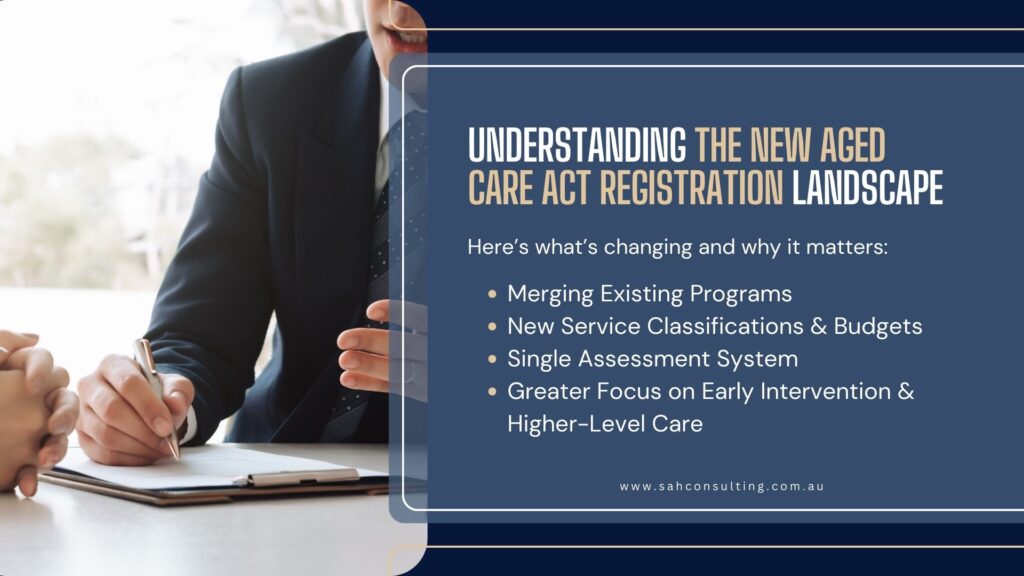Australia’s aged care sector is going through major changes. As the population ages and more people prefer to receive care at home, the government is introducing reforms to help older Australians stay independent for longer. A key part of this is the Support at Home program, set to roll out on 1 July 2025. This program will replace the Home Care Packages (HCP) and the Short-Term Restorative Care Programme. The Commonwealth Home Support Programme (CHSP) will follow, transitioning no earlier than 2027.
For aged care providers, these changes present both prospects and difficulties. Although the reforms seek to enhance the quality and accessibility of care, they simultaneously bring about new service frameworks, funding systems, and compliance obligations. To succeed in this changing environment, providers must reevaluate their registration, compliance, and operational approaches—or risk getting left behind.
With these changes, many providers are asking, how do aged care providers become accredited under the new system? Understanding the reforms now is vital for staying compliant and competitive in the years ahead.
Understanding the New Aged Care Act Registration Landscape
The Support at Home program is a major shift in Australia’s aged care system. It aims to simplify in-home care, improve service quality, and give older Australians more control over their care. However, these changes will significantly impact aged care providers.
Here’s what’s changing and why it matters:
- Merging Existing Programs – Home Care Packages (HCP) and the Short-Term Restorative Care Programme will be replaced, and the Commonwealth Home Support Programme (CHSP) will transition later.
- New Service Classifications & Budgets – Funding structures will change, requiring providers to adapt their services to meet new pricing models.
- Single Assessment System – A unified system will determine eligibility and care levels, meaning providers must align their offerings accordingly.
- Greater Focus on Early Intervention & Higher-Level Care – Providers will need to support older Australians with proactive care models, not just reactive services.
With more stringent compliance and registration criteria, errors might result in funding losses or penalties for non-compliance. Recognising and getting ready for these changes at this moment is essential for providers to remain competitive and keep providing quality care.

How Professional Aged Care Registration Consulting Can Help
Navigating the changes in Australia’s aged care system can be overwhelming, especially with new rules, funding models, and service requirements coming into play. That’s where professional aged care registration consulting makes a real difference.
With the right support, providers can stay compliant, make the most of funding opportunities, and smoothly transition into the new Support at Home program. It also helps answer a common question: how do aged care providers become accredited under the updated system?
Expert Guidance on Compliance and Regulations
The shift to the Support at Home program presents new classification tiers and funding frameworks, making it essential for providers to comprehend how their services align. Misunderstanding these classifications or not adhering to budget allocations might result in lost funding opportunities or compliance problems.
Consultants for aged care registration help providers manage these complexities by helping them accurately categorise their services, fulfil eligibility requirements, and adhere to changing regulations. They also help with payment arrangements for providers and the requirements for participant contributions, which may be difficult to handle within the new system. With professional advice, providers can prevent financial errors and maximise their funding opportunities while staying compliant.
With expert guidance and tools like an Aged Care accreditation checklist, providers can avoid costly mistakes, meet compliance standards with confidence, and make the most of funding opportunities.
Streamlining the Registration Process
Registering under the new Support at Home framework involves significant administrative work. From meeting documentation and accreditation requirements to ensuring all compliance standards are met, the process can be overwhelming. Any errors or missing details could cause delays or even result in rejection, putting a provider’s operations at risk.
Consultants help by simplifying and managing the registration process, ensuring that everything is correctly submitted and in order. With professional support, providers can focus on their core mission—delivering quality care—without getting bogged down by paperwork and bureaucratic hurdles.
Optimising Service Offerings and Funding Utilisation
The new framework brings changes to service classifications and pricing models, which means providers need to reassess how they structure their offerings. Aligning services with the government’s new pricing models is essential for maximising funding opportunities while maintaining high-quality care.
Consultants work closely with providers to create service packages that fulfill client requirements and funding criteria. They guarantee that pricing models are refined, assisting providers to stay competitive in the changing aged care industry. By actively adapting to these shifts, providers can maintain and expand their business while still delivering the highest quality of care.
Supporting Providers in Care Management and Service Delivery
In addition to compliance and funding, aged care providers need to adjust to new models of care management. As self-management becomes more prevalent, giving participants greater control over their care, providers must modify their service delivery methods.
Consultants provide training and strategic advice to assist providers in effectively implementing new care management approaches. This encompasses assistance in incorporating self-management frameworks while upholding excellent service quality. By keeping pace with these changes, providers can boost client satisfaction, increase operational efficiency, and secure long-term sustainability in the sector.
Successfully navigating the Support at Home transition requires more than just meeting regulatory requirements—it’s about positioning your aged care business for long-term success. With complex compliance standards, evolving funding structures, and shifting care models, professional guidance can make all the difference.
SAH Consulting helps providers cut through the complexity with expert support at every step. From ensuring accurate registration to optimising service offerings, our team is here to make the process smoother and more efficient. We offer services for new providers and those wanting to re-register under the new system. Remember, having the right expertise on your side can help prevent costly mistakes and delays.
The Long-Term Benefits of Partnering with a Consultant

Adapting to the new Aged Care Act isn’t just about meeting compliance—it’s about building a strong, future-ready care service. Working with a consultant is a long-term investment, not just a quick fix. Here’s how it helps:
- Simplifies the approval process – Consultants help answer key questions and manage the complex registration process.
- Reduces admin workload – Providers can focus on care delivery while consultants handle paperwork and compliance tasks.
- Improves service models – Consultants align your offerings with updated funding structures and care categories to boost efficiency and outcomes.
- Maximises funding – By fine-tuning service delivery and pricing, you can unlock more funding opportunities.
- Strengthens reputation – Staying compliant and delivering consistent service builds trust with both clients and regulators.
- Keeps you future-ready – With more changes coming (like the CHSP shift in 2027), expert guidance ensures you’re always one step ahead.
The Bottomline
The elderly care industry is experiencing one of its major changes, and delaying adaptation is not a choice. The new Aged Care Act and the Support at Home initiative will transform provider operations, complicating compliance, registration, and service optimisation to an unprecedented degree.
Working with aged care registration consultants can make the transition much easier. They provide strategic support to help you stay competitive, compliant, and financially secure. From understanding funding changes to improving service offerings, expert guidance ensures a smoother transition and long-term success. They also help answer key questions, such as how aged care providers become accredited under the new system.
Need help navigating the new aged care system? Contact SAH Consulting Services today for a free consultation and take the first step toward a seamless transition.
